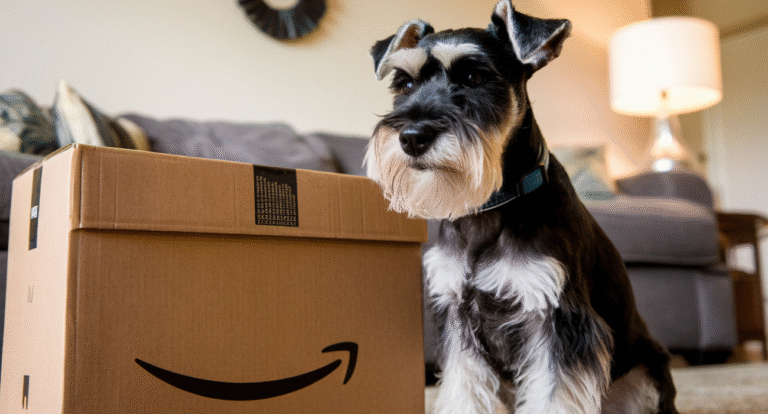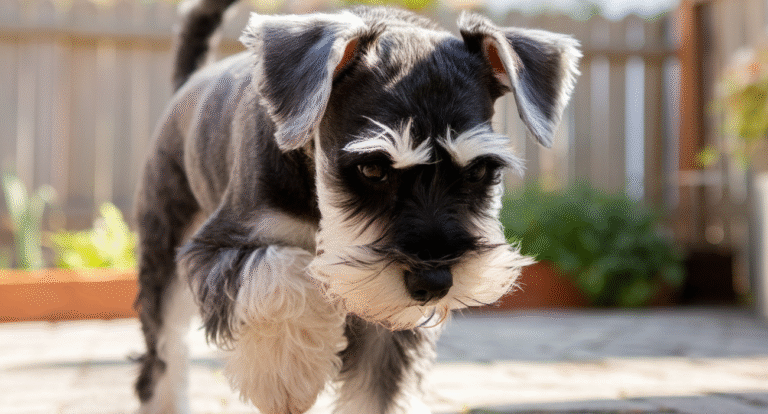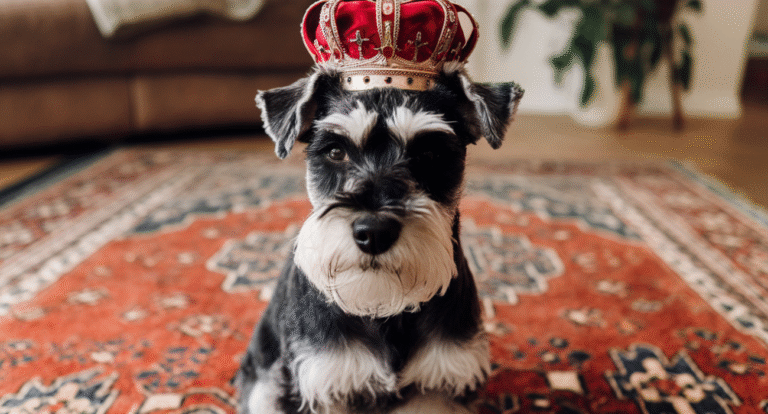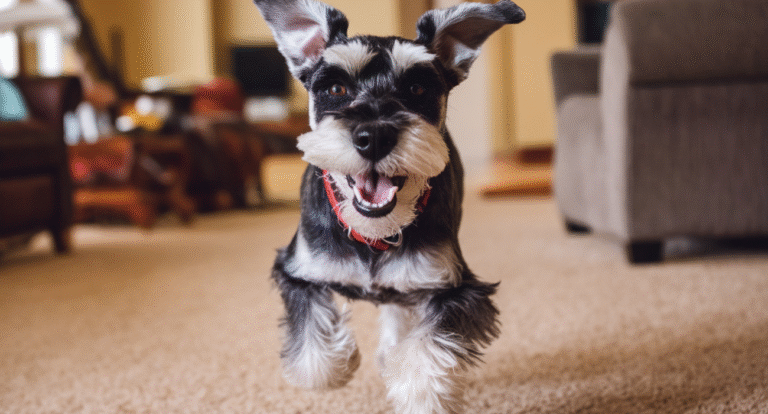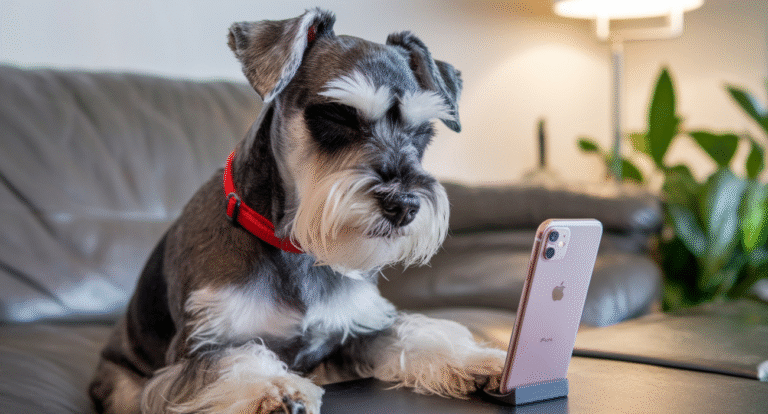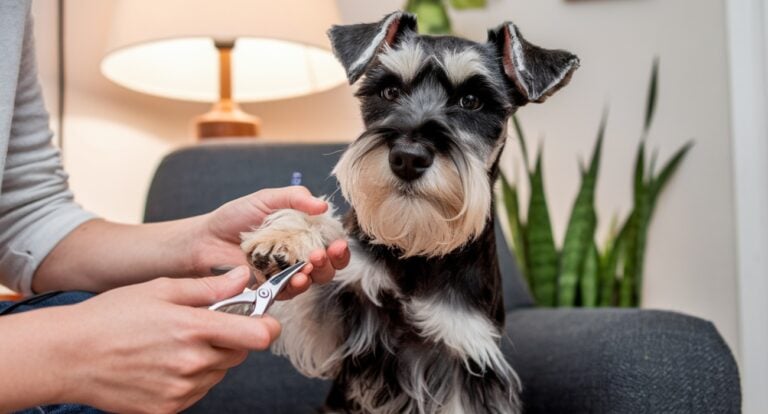Poop eating is more common than you think. Here’s why Schnauzers do it and how to stop it fast.
Look, we need to talk about something disgusting. Your adorable Schnauzer, with that distinguished beard and those soulful eyes, has a dirty little secret. Sometimes they treat the backyard like an all you can eat buffet, and poop is on the menu. If you’ve caught your fuzzy friend red handed (or should we say brown bearded?), you’re definitely not alone.
This revolting habit has a fancy scientific name: coprophagia. But calling it something sophisticated doesn’t make it any less horrifying when you’re trying to enjoy your morning coffee and witness your dog’s questionable life choices. The good news? There are real reasons why Schnauzers do this, and even better, there are proven ways to make it stop.
Understanding the Gross Reality
Let’s start with the uncomfortable truth: coprophagia is surprisingly normal in the dog world. Studies suggest that roughly 16% of dogs are serious poop eaters (consuming feces more than five times), while about 24% have been caught doing it at least once. Schnauzers, with their curious nature and food motivated personalities, sometimes fall into this category more than we’d like.
The behavior can take different forms. Some Schnauzers exclusively raid the cat’s litter box (feline feces is apparently the caviar of the poop world). Others prefer their own productions or those of fellow dogs. Some are opportunistic snackers, while others seem to have a genuine compulsion that’s tougher to crack.
Why Schnauzers Eat Poop: The Real Reasons
Nutritional Deficiencies and Digestive Issues
Your Schnauzer might be eating poop because they’re literally trying to tell you something is missing from their diet. When dogs aren’t absorbing nutrients properly, they may instinctively seek those nutrients elsewhere, and unfortunately, feces can contain partially digested proteins and vitamins.
Schnauzers can be prone to pancreatitis and other digestive sensitivities, which means their bodies might not be processing food as efficiently as they should. This can create a cycle where they’re eating quality food but still feeling nutritionally unsatisfied. Additionally, cheap dog foods with excessive fillers leave behind feces that actually smells appealing to dogs because of the undigested grains and proteins.
When your dog’s digestive system isn’t working at full capacity, they may seek nutrients in the most unappetizing places imaginable. What looks disgusting to us might smell like a solution to them.
Behavioral and Psychological Triggers
Sometimes the poop eating has absolutely nothing to do with nutrition and everything to do with what’s going on in your Schnauzer’s head. Anxiety, stress, and boredom are major culprits. Schnauzers are intelligent, energetic dogs who need mental stimulation. When they’re understimulated or anxious, they can develop compulsive behaviors, and yes, coprophagia can be one of them.
Puppies explore the world with their mouths, and unfortunately, that includes sampling everything in the backyard. Most grow out of it, but some don’t, especially if the behavior gets accidentally reinforced. If your Schnauzer learned that eating poop gets them immediate attention (even negative attention), they might continue the behavior simply for the interaction.
Learned Behavior from Puppyhood
Mother dogs instinctively clean up after their puppies by eating their waste. It’s a survival mechanism that keeps the den clean and odor free. Puppies observe this and may imitate it. Additionally, if your Schnauzer came from a situation where they were confined with their own waste (like a puppy mill), they may have developed the habit simply as a coping mechanism in an unclean environment.
Medical Conditions That Drive Coprophagia
Several health issues can trigger or worsen poop eating behavior:
| Medical Condition | How It Contributes to Coprophagia |
|---|---|
| Exocrine Pancreatic Insufficiency (EPI) | The pancreas doesn’t produce enough digestive enzymes, leaving food partially undigested and nutritionally tempting in feces |
| Intestinal Parasites | Worms and other parasites steal nutrients, leaving the dog feeling perpetually hungry and nutrient deprived |
| Diabetes or Thyroid Issues | These conditions can increase appetite dramatically and affect nutrient absorption |
| Malabsorption Syndromes | Various conditions prevent proper nutrient uptake, creating deficiency driven behaviors |
| Cushing’s Disease | Can cause increased appetite and changes in behavior, including coprophagia |
If your Schnauzer suddenly starts eating poop when they never did before, or if they’re also showing other symptoms like weight loss, increased thirst, or changes in coat quality, a vet visit should be your first priority.
How to Stop the Poop Eating Madness
Immediate Management Strategies
The simplest solution? Remove the temptation entirely. Follow your Schnauzer outside every single time and pick up waste immediately. Yes, it’s tedious. Yes, you’ll become that person who’s weirdly obsessed with yard cleanliness. But removing access is the fastest way to break the habit while you address underlying causes.
Keep your Schnauzer on a leash during potty breaks if needed. This gives you control to redirect them the moment they show interest in feces. The second they start moving toward it, use a firm “leave it” command and redirect to something positive.
Success isn’t about perfection; it’s about consistency. Every prevented incident is progress, even if you have occasional setbacks.
Dietary Interventions That Work
Switching to a high quality, easily digestible dog food makes feces less appealing because there’s less undigested material. Look for foods with named meat proteins as the first ingredient and minimal fillers. Some Schnauzer owners have success with limited ingredient diets or foods formulated for sensitive stomachs.
Adding specific supplements can help too:
- Digestive enzymes: These help your Schnauzer actually absorb nutrients from their food, reducing nutritional deficiencies
- Probiotics: Support gut health and improve digestion overall
- Vitamin B complex: Deficiencies in B vitamins have been linked to coprophagia
- Pineapple or pumpkin: Small amounts of these foods make feces taste unpleasant (hard to imagine it could taste worse, but apparently it can)
There are also commercial products designed specifically to make feces unpalatable. Products containing ingredients like monosodium glutamate or chamomile can be added to your dog’s food. Results vary, but many owners report success.
Training and Behavioral Modification
Teaching a rock solid “leave it” command is absolutely essential. Practice with treats and toys first, then gradually work up to more tempting items. When your Schnauzer successfully ignores feces and responds to your command, reward them immediately with something they find incredibly valuable.
Increase mental and physical stimulation dramatically. A tired, mentally satisfied Schnauzer is less likely to engage in compulsive behaviors. Add puzzle feeders, increase walk duration, introduce scent work games, or try agility training. Bored Schnauzers find their own entertainment, and sometimes that entertainment is disgusting.
Environmental and Lifestyle Changes
If you have multiple pets, keep litter boxes completely inaccessible to your Schnauzer. Baby gates with cat doors, elevated litter boxes, or litter box furniture with cat sized entrances can solve the cat poop raiding problem entirely.
Create a more enriching environment overall. Rotate toys to keep them interesting. Provide appropriate chewing outlets. Ensure your Schnauzer gets adequate socialization and isn’t spending long periods alone and understimulated.
When to Call the Vet
Don’t hesitate to involve your veterinarian if:
- The behavior starts suddenly in an adult dog
- Your Schnauzer is also showing signs of illness (vomiting, diarrhea, lethargy, weight changes)
- You’ve tried behavioral interventions consistently for several weeks without improvement
- The behavior is becoming more frequent or compulsive
Your vet can run tests to rule out medical causes and may prescribe medications if anxiety or compulsive disorders are driving the behavior. Sometimes a combination of medical treatment and behavioral modification is the winning formula.
The Bottom Line (No Pun Intended)
Watching your distinguished little Schnauzer eat poop is horrifying, but you’re not dealing with an unsolvable problem. Whether the cause is medical, nutritional, or behavioral, there are concrete steps you can take to eliminate this disgusting habit. Start with a vet checkup to rule out health issues, improve diet quality, increase mental stimulation, and become absolutely religious about immediate waste removal.
Will it require patience? Absolutely. Will there be setbacks? Probably. But with consistency and the right approach, you can break your Schnauzer of this nasty habit and get back to enjoying those sweet puppy kisses without wondering what they’ve been snacking on.
Remember: You’re not alone in this battle, and you’re not a bad dog parent. You’re someone who cares enough to find solutions, and that’s exactly what your bearded little friend needs.

